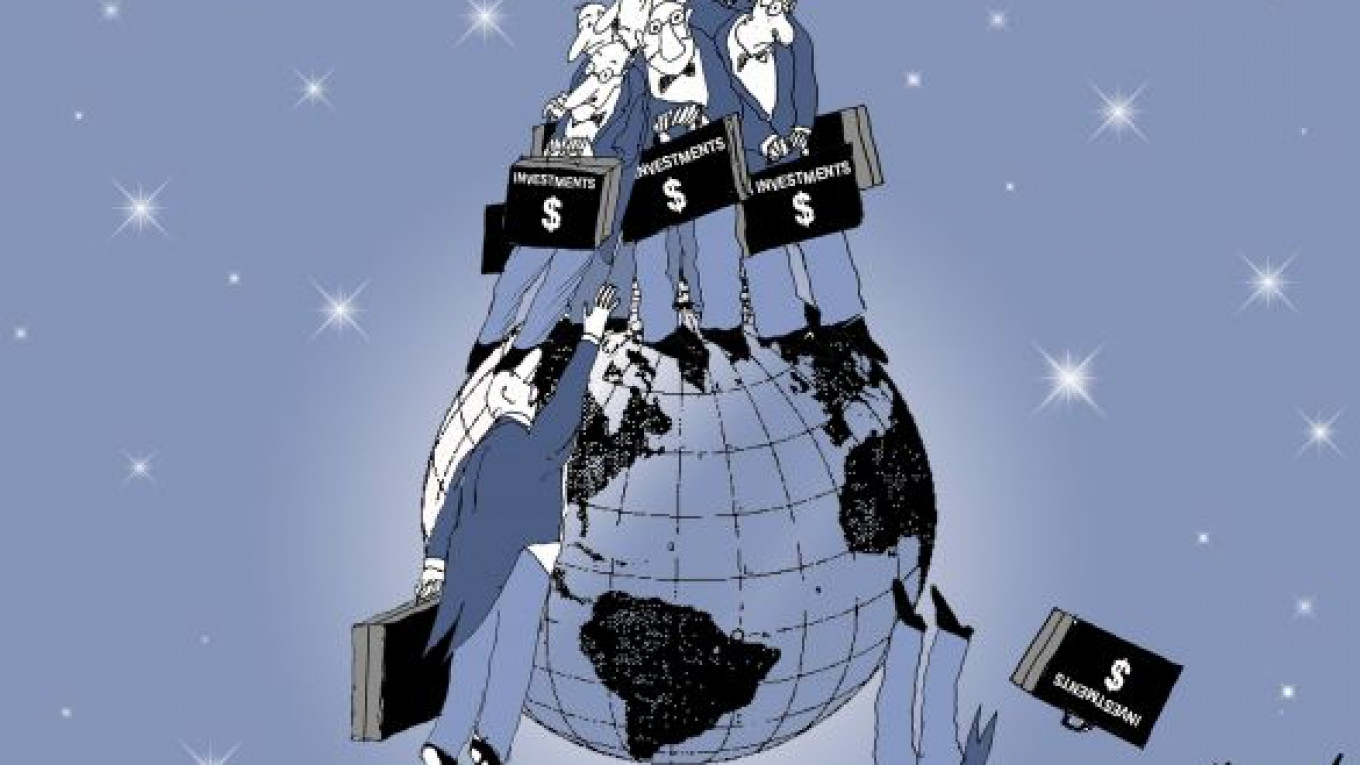Political uncertainty, now affecting almost all of the world's major economies, has combined with economic unpredictability to create an even more uncertain backdrop for global markets. In the United States, Europe and China, political transition is having a direct impact on macroeconomic trends and on the perception of global investment risk. This combination is keeping investors wary of risk investments, and Russian assets are near the top of that list.
The problem for investors in Russia, and the price that they are willing to pay for assets, is that the global political and economic warning signs point directly at the country. This comes at a time when domestic political transition has also created an unstable backdrop and has shoved the pendulum toward the high risk end of the scale. Political questions only compound the fact that Russia does not have a strong enough domestic economic foundation to compensate for the commodities-export risk. Twelve years of living off rising commodity export revenues with not enough industrial and economic reform progress means that the risk premium used in valuation models is very high end, even as, in fact, the country's fiscal strength and relatively strong economic growth point to a lower risk premium and a much higher asset valuation base. For that reason, Russian stocks directly exposed to the relatively fast growing domestic economy are trading at an average discount of 26 percent compared with global emerging market peers. This is despite the fact that Russian stocks in this market segment are expected to show average earnings growth of 17 percent for the next year versus 10 percent growth among emerging markets.
The memory of 2008 is very vivid and serves as a red flag to investors. The RTS Index hit a record high of more than 2,500 in May of that year, only to collapse to 500 seven months later as oil fell sharply and the political manifestos proved hollow. Today it is a case of "show me the money" — that is, start delivering on promises and then investor flows will increase. That said, in isolation, the Russia investment case is favorable. The macro backdrop is relatively good. The average oil price, year to date, is above the budget break-even point, reported earnings support the valuation assumptions, and most sectors are trading at a significant discount to their emerging market peer groups. But this matters little as long as the threat of another significant global slowdown remains.
The debt and deficit crisis in Europe has been wrapped up in politics for many months, with governments cautious of imposing even stricter budget spending curbs for fear of an escalation of public protests. Following the election results in France and the stalemate in Greece, governments elsewhere will be even more wary of imposing strict austerity measures. But, at the same time, it is very clear that the problems in Europe can only be solved with political unity and joint actions across the region. Whether that unity can now actually be achieved before an even more serious escalation in the crisis is now doubtful.
The U.S. election season will also have a strong impact on global economics. In the United States, the contest between incumbent President Barack Obama and Republican challenger Mitt Romney has now started in earnest. The core battles are likely to be jobs and the economy, as well as health care. This may be more favorable for market sentiment as the administration will try to ensure enough stimulus is available to ensure steady economic recovery. This is the position of the Federal Reserve as well. But, once elected, the next administration will have to start dealing with the deficit more seriously.
The Chinese leadership change will take effect in March 2013. With some concerns over internal leadership stability, the Chinese government is expected to try to ensure economic stability in the meantime. Hence, the sometimes surprising reaction by investors to disappointing China data is in the belief that bad economic news will only hasten further loosening to boost growth. This waiting game also adds volatility not only to the China market, but also to those assets linked to China, such as oil, metals and Russia.
Oil and politics are well-established bedfellows. One can rarely explain the price of the former without some attribution to the latter. The Iran nuclear talks have established a diary date for a widening of the European Union embargo, which will make it very difficult for Iran to get paid for any oil it exports other than via intermediaries or by subterfuge. This threat has probably added about $15 per barrel to both the Brent and Urals prices. The Egyptian presidential election will take place later this month. There is already some tension over the prohibition against some candidates and, unless resolved, it may lead to political violence at that time or in the aftermath. Instability in the region, especially with the Muslim Brotherhood in such a prominent role, highlights the broader threat to the region and the risk of a rerun of last year's violent clashes. All of that is more likely to keep some risk premium in the oil price and makes Saudi Arabia's declared target price of $100 per barrel more realistic than lower estimates.
Then there is Russia's domestic political factor. The new government will be announced next week and will immediately face a number of difficult issues that will shape economic performance and investment return from Russian assets through 2013. The budget review will be the first item, and the task will be to accommodate the extra spending promised by President Vladimir Putin without expanding the oil revenue requirement. Beyond that, the major priority will be to advance programs and reforms that start to address the perception of Russia as a dangerous and difficult country in which to do business or invest.
Chris Weafer is chief strategist at Troika Dialog.
A Message from The Moscow Times:
Dear readers,
We are facing unprecedented challenges. Russia's Prosecutor General's Office has designated The Moscow Times as an "undesirable" organization, criminalizing our work and putting our staff at risk of prosecution. This follows our earlier unjust labeling as a "foreign agent."
These actions are direct attempts to silence independent journalism in Russia. The authorities claim our work "discredits the decisions of the Russian leadership." We see things differently: we strive to provide accurate, unbiased reporting on Russia.
We, the journalists of The Moscow Times, refuse to be silenced. But to continue our work, we need your help.
Your support, no matter how small, makes a world of difference. If you can, please support us monthly starting from just $2. It's quick to set up, and every contribution makes a significant impact.
By supporting The Moscow Times, you're defending open, independent journalism in the face of repression. Thank you for standing with us.
Remind me later.








